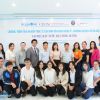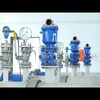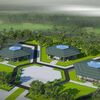The Hanoitimes - Hanoi authorities always welcome German businesses to invest, and create conditions for seminars to exchange experience in numerous fields.
Recognizing Germany's scientific and technical level in all fields, Hanoi will actively apply German technology in urban development, stated Chairman of the municipal People’s Committee Nguyen Duc Chung.
Chung made his statement while hosting a reception for Martin Dulig, deputy minister and minister of Economic Affairs, Labor, and Transport of the German Federal State of Sachsen, in Hanoi on November 19.
Chung made his statement while hosting a reception for Martin Dulig, deputy minister and minister of Economic Affairs, Labor, and Transport of the German Federal State of Sachsen, in Hanoi on November 19.
 Chairman of the Hanoi People’s Committee Nguyen Duc Chung meets Martin Dulig, Deputy Minister of German Federal State of Sachsen. Photo: Tu Anh |
Briefing on Hanoi’s the socio-economic situation, Chairman of Hanoi People's Committee Nguyen Duc Chung said that in the past eight years, the city’s average economic growth has been at 7.41%.
In 2018, Hanoi has received 26 million tourists, including five million foreign visitos. Rapid development has also led to a number of challenges for Hanoi, including environmental pollution, traffic jams, infrastructure and so on, Chung added.
For these issues, Hanoi’s development program in the period of 2016-2020 has identified appropriate strategies. Accordingly, the city has set the target of supplying all of its citizens with European-standard water by 2020, Chung stressed.
In response to the goal, over the past two years, 24 foreign and domestic investors have joined 31 projects of cleaner water supply. The Duong river plant, carried out by a German joint venture between Aone Deutschland AG and Strabang, was among those projects. The plant began operational in October this year, producing 150,000 cubic meters of water per day and the second phase is expected to increase to 300,000cu.m of water per day in October 2019.
In the coming time, Hanoi plans to build more water plants as well as water supply infrastructure, which apply technology from Europe, especially from Germany.
In addition to clean water, Hanoi also focuses on building an air monitoring system in the capital, developing a waste treatment plant based on the power generating technology, Chung noted.
Therefore, Hanoi authorities always welcome German businesses to invest, and create conditions for seminars to exchange experience in these fields, Chung said.
Affirming the importance of developing relations between Hanoi and other German’s localities, the chairman of Hanoi People's Committee recalled a Hanoi delegation visited Germany and signed cooperation with Frankfurt in June.
He added that the German Embassy in Vietnam is also working smoothly with the Hanoi People's Committee to successfully organize the Deutschlandfest Hanoi 2018.
In March 2019, the Chamber of Commerce and Industry of Frankfurt plans to work with Hanoi to hold an investment promotion conference, Chung informed.
The chairman of the City People's Committee also hopes to spur the connection with the German business community in Vietnam, as well as expand investment cooperation.
For his part, Martin Dulig emphasized his trust in the friendly relationship between Germany and Vietnam.
Germany's cities and Hanoi are facing the challenges and opportunities of the Industrial Revolution 4.0, said Martin Dulig. With its experience in waste water and environmental pollution treatment, as well as transport development, Sachsen is looking forward to joining collaboration program with Vietnam and Hanoi in particular, contributing to local urban growth and better living standards for all, he added.
Martin Dulig once again affirmed the ambition to promote relations between the German’s localities with Hanoi with the opening of the German – Vietnamese house in in Leipzig on November 12.
In 2018, Hanoi has received 26 million tourists, including five million foreign visitos. Rapid development has also led to a number of challenges for Hanoi, including environmental pollution, traffic jams, infrastructure and so on, Chung added.
For these issues, Hanoi’s development program in the period of 2016-2020 has identified appropriate strategies. Accordingly, the city has set the target of supplying all of its citizens with European-standard water by 2020, Chung stressed.
In response to the goal, over the past two years, 24 foreign and domestic investors have joined 31 projects of cleaner water supply. The Duong river plant, carried out by a German joint venture between Aone Deutschland AG and Strabang, was among those projects. The plant began operational in October this year, producing 150,000 cubic meters of water per day and the second phase is expected to increase to 300,000cu.m of water per day in October 2019.
In the coming time, Hanoi plans to build more water plants as well as water supply infrastructure, which apply technology from Europe, especially from Germany.
In addition to clean water, Hanoi also focuses on building an air monitoring system in the capital, developing a waste treatment plant based on the power generating technology, Chung noted.
Therefore, Hanoi authorities always welcome German businesses to invest, and create conditions for seminars to exchange experience in these fields, Chung said.
Affirming the importance of developing relations between Hanoi and other German’s localities, the chairman of Hanoi People's Committee recalled a Hanoi delegation visited Germany and signed cooperation with Frankfurt in June.
He added that the German Embassy in Vietnam is also working smoothly with the Hanoi People's Committee to successfully organize the Deutschlandfest Hanoi 2018.
In March 2019, the Chamber of Commerce and Industry of Frankfurt plans to work with Hanoi to hold an investment promotion conference, Chung informed.
The chairman of the City People's Committee also hopes to spur the connection with the German business community in Vietnam, as well as expand investment cooperation.
For his part, Martin Dulig emphasized his trust in the friendly relationship between Germany and Vietnam.
Germany's cities and Hanoi are facing the challenges and opportunities of the Industrial Revolution 4.0, said Martin Dulig. With its experience in waste water and environmental pollution treatment, as well as transport development, Sachsen is looking forward to joining collaboration program with Vietnam and Hanoi in particular, contributing to local urban growth and better living standards for all, he added.
Martin Dulig once again affirmed the ambition to promote relations between the German’s localities with Hanoi with the opening of the German – Vietnamese house in in Leipzig on November 12.
ANH KIET










